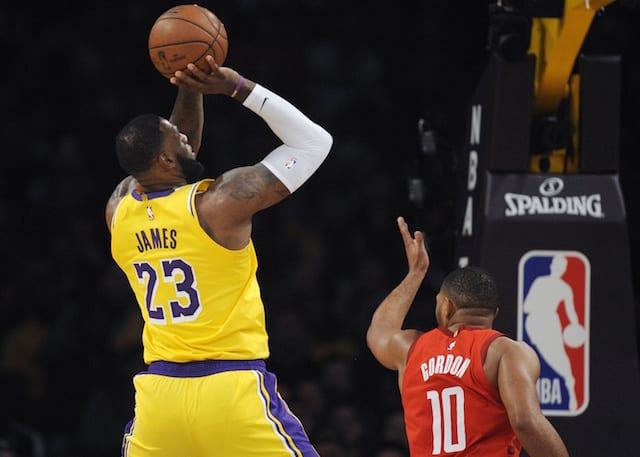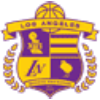Finally, the Los Angeles Lakers know who their opponent in the second round of the NBA Playoffs will be. The Houston Rockets barely survived their run-in with the Oklahoma City Thunder, squeaking by with a two-point win in Game 7 on Wednesday night.
With their second-round series starting Friday, it’s fair to wonder how much the Rockets have left in the tank after being taken to the brink by the Thunder. Still, it would be a mistake for the Lakers to take this team lightly.
The Rockets present a few significant challenges, most notably, dealing with superstar guards James Harden and Russell Westbrook. Both have the kind of scoring talent that could swing a game or even a series if they get hot, and the Lakers are a bit thin on perimeter defenders after losing Avery Bradley prior to going to Orlando.
Fortunately, the Lakers got a bit of a crash course in dealing with high-scoring guards after handling Damian Lillard and CJ McCollum in the first round. Alex Caruso proved himself on the playoff stage with his ability to for Lillard into more difficult shots, and Danny Green’s size should help him whenever he’s assigned to Harden.
That said, if there is one thing the Lakers learned from the Portland series, it’s that red-hot guards can’t be stopped by individuals; it takes a whole team. The Lakers resorted to sending double-teams at Lillard on occasion, which forced the remaining three defenders to react with speed and precision in order to prevent giving up an open look.
Expect more of same against the Rockets, with the Lakers focusing on sharp rotations and closing out on shooters to keep the 3-point happy Rockets from achieving liftoff.
Despite all of the attention that Harden and Westbrook draw, the true story of this series will be the collision of two very different styles of play. Midseason, the Rockets decided to fully embrace small ball, trading away center Clint Capela in order to bring in Robert Covington, the lanky wing who stands as the tallest Houston starter at just 6’7”.
Covington’s 7’2” wingspan allows him to play bigger than his actual height and contest at the rim, but he’s at a disadvantage, which the Rockets are perfectly fine with. Head coach Mike D’Antoni has gone full mad scientist, willingly sacrificing the rebounding and rim protection that a true center can bring and believing that, in the long run, a barrage of threes is their path to victory.
However, their 5-out offense full of snipers spotted up behind the arc it’s just about shooting threes, it’s also about pulling shot-blockers away from the rim. The goal is to drag rim protecting bigs, like JaVale McGee and Dwight Howard, into unfamiliar territory on the perimeter, where they will be too far away to help contest Harden and Westbrook’s drives.
The Lakers, who almost always have at least one (and sometimes two) of Anthony Davis, McGee and Howard on the floor, the question is whether or not they will adjust their style of play to match the Rockets.
Los Angeles can increase their perimeter defense and ability to contest threes by inserting Kyle Kuzma in place of Howard or McGee, but it may be preferable to first find out if the bigs can simply make Houston pay for going small by bullying them in the paint and on the boards.
The Rockets are gambling that, even if true centers have an advantage with their size, the open threes they find on the other end when lumbering bigs can stay with them make it worth it.
Oklahoma City nearly defeated the Rockets despite playing true centers like Steven Adams and Nerlens Noel, and were competitive on defense. It is possible to keep the rebounding and rim protection of a center on the floor against the Rockets, it just isn’t easy.
If the Lakers are going to pull it off, they will have to punish the Rockets in the paint, but despite their size disadvantage, Houston fights hard there. Covington, PJ Tucker and Jeff Green are all factors down low, and Westbrook is a fantastic rebounder for a guard.
They invite teams to lob the ball into the post and then swarm bigs to force turnovers, which means the Lakers have to be selective with when they try to exploit mismatches.
However, if the Lakers find they are in a losing battle because their bigs can’t defend the 3 well enough, head coach Frank Vogel does have the option of going smaller. The Rockets, however, have pushed all of their chips in on small ball.
If the Lakers’ bigs prove to be too much for Houston to handle, the only actual center on the Rockets’ roster is Tyson Chandler. There are essentially no changes the Rockets can make to adjust; they are what they are.
Houston is good, and if the Lakers don’t figure out how to play against them, the path to a championship could get very bumpy. The hope is that, in a seven-game series, the Lakers will become accustomed to the quirks presented by the Rockets and figure out how to exploit them.
This series ultimately will come down to which team can enforce their will, the small-ball Rockets or gigantic Lakers?
Have you subscribed to our YouTube channel? It’s the best way to watch player interviews, exclusive coverage from events, participate in live shows, and more!





